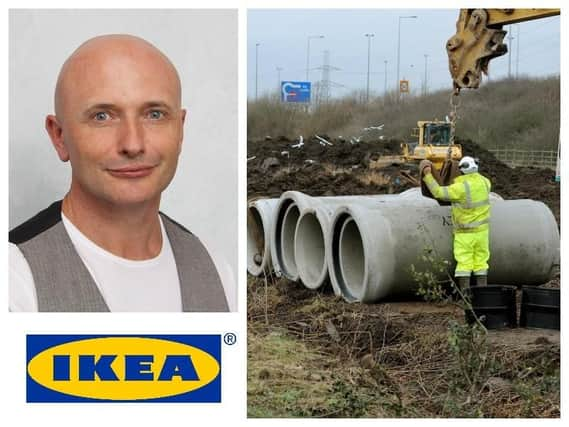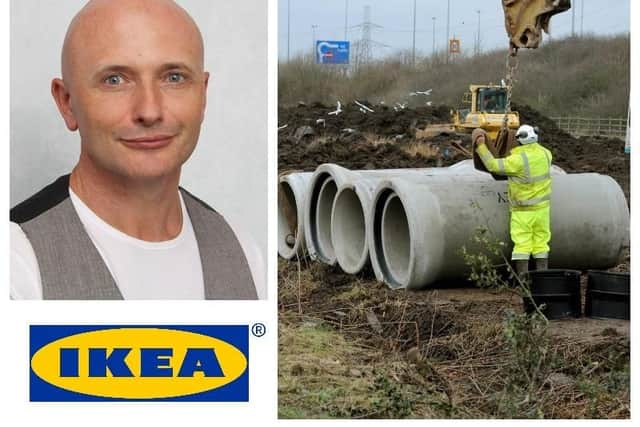'˜Lancashire not seen as a safe bet by retailers'


In recent weeks the region has faced a number of challenging news stories in the retail sector.
Only last week did we get the news that Ikea has pulled out of the recently rebranded Lancashire Central, a site that was expected to create 4,500 much-needed jobs and only 24 hours earlier Tesco pulled out of a planned 24-hour mega-store at Penwortham.
Advertisement
Hide AdAdvertisement
Hide Ad

Let’s not also forget the ill-fated TIthebarn project in Preston City Centre that would have brought a rival to the Trafford Centre to the city.
So what is really happening in the sector? The region’s fate is more inter connected with much bigger issues that than local ones.
Ikea cited ‘economic reasons’ for the decision not to press ahead with the proposed Lancashire Central development and clearly the company does have a point.
The whole of the UK retail sector seems to be facing huge challenges with the High Street and out- of-town retail parks alike affected.
Advertisement
Hide AdAdvertisement
Hide AdFrom last week’s news that Mothercare was to close around 50 stores nationally, to the collapse of BHS, Toys R Us and Maplin’s to the proposed merger of Sainsbury’s and Asda, the whole of the retail landscape is changing not only in our region but nationally. So what are the key factors?
Firstly, retailing is an extremely expensive business not just in terms of staffing and stock but also the retail environment and keeping the look and feel of a shopping experience in line with ever increasing public expectations. Many people don’t just want to go shopping they want an experience and this costs retailers dearly.
Secondly, the fixed costs that retailers have to pay are extremely high with regards to property.
Many retailers claim that they are unable to keep up with rent payments which they often state is unrealistically based on historical factors rather than their current trading positions.
Advertisement
Hide AdAdvertisement
Hide AdThirdly, the rise of the internet which means that competitors can be located not just locally but in reality anywhere in the world.
Shoppers can access goods and services from the their own home or on the bus into work using Wi-Fi or roaming data on their smart phone or tablet.
Fourthly, with maturity of the internet this has given rise the power of super powers such as Amazon that have in reality become a virtual department store that can supply us with virtually everything and anything that we wish for often the next day.
This has been aided by new safe and simple payment methods such as PayPal and World Pay along with smart phone specific payment apps.
Advertisement
Hide AdAdvertisement
Hide AdIt is widely expected that Amazon will move into food retailing in the near future and this should pose yet a further challenge to the retailing sector.
What is often overlooked is that developers and retailers are commercial organisations drive primarily by profit rather than community or service so they will invest in areas whereby they feel that they will get the best return on investment.
Hence, Manchester and Salford has become a boom cities experiencing decades of sustained growth. Why? Because they represent strong returns on investment. Sadly, developers see Lancashire as offering a lesser return on investment.
Much of recent development in key parts of the UK, including the North West has come as a result of ‘inward’ investment this term basically means companies from overseas invest in the UK.
Advertisement
Hide AdAdvertisement
Hide AdInvestors from overseas like stability and a Brexit Britain presents real challenges from an economic perspective as the UK has been seen as ‘safe bet’ but since the referendum growth versus key competitors has been sluggish, the value of the pound has been under pressure and clarity over the UK’s trading position and market access seems to change according to which Politian one listens to.
The net result a reduction in confidence in the UK by overseas investors.
The economic outlook is complex affair and varies greatly according to who you listen to and your own particular values.
However, we are living in a global economy with much of the food we eat and goods we use made or designed overseas so global issues really do have a profound impact locally.
